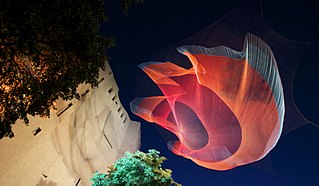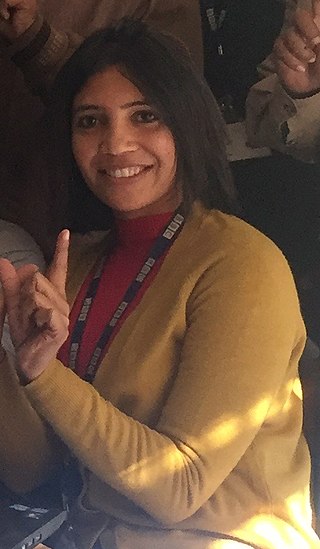
A film festival is an organized, extended presentation of films in one or more cinemas or screening venues, usually in a single city or region. Increasingly, film festivals show some films outdoors. Films may be of recent date and depending upon the festival's focus, can include International and Domestic releases. Some film festivals focus on a specific filmmaker, genre of film, or subject matter. Several film festivals focus solely on presenting short films of a defined maximum length. Film festivals are typically annual events. Some film historians, including Jerry Beck, do not consider film festivals as official releases of the film.

Kathmandu, officially Kathmandu Metropolitan City, is the capital and most populous city of Nepal with 845,767 inhabitants living in 105,649 households as of the 2021 Nepal census and approximately 4 million people in its urban agglomeration. It is located in the Kathmandu Valley, a large valley in the high plateaus in central Nepal, at an altitude of 1,400 metres.

In the art world, a Biennale, Italian for "biennial" or "every other year", is a large-scale international contemporary art exhibition. The term was popularised by the Venice Biennale, which was first held in 1895, but the concept of such a large scale, and intentionally international event goes back to at least the 1851 Great Exhibition in London.

The Canadian Film Institute (CFI) (French: Institut canadien du film (ICF)) Canadian Film Institute involves Canada in the film production, study, appreciation process of film/moving images for cultural and educational purposes. The Canadian Film Institute organizes ongoing public film programming and artist talks, provides educational enhancements on its websites, distributes a small collection of films, and is involved in the publication of books and monographs on various aspects of Canadian cinema. CFI screenings and events are held in Ottawa Ontario, mainly at The Auditorium at 395 Wellington St. (formerly operated by Library and Archives Canada).
NewFest: The New York Lesbian, Gay, Bisexual, & Transgender Film Festival put on by The New Festival, Inc., is one of the most comprehensive forums of national and international LGBT film/video in the world.
The Audio-Visual Preservation Trust of Canada. originally the Alliance for the Preservation of Canada's Audio-Visual Heritage, was a charitable non-profit organization dedicated to promoting the preservation of Canada's audiovisual heritage, and to facilitating access to regional and national collections through partnerships with members of Canada's audiovisual community.
The Cultural Studies Association (CSA) was founded in 2003 and is a non-profit membership association for scientific purposes in the field and discipline of cultural studies. Located in Chicago, IL, USA, the CSA is headed by an executive committee of American academics who guide the association's efforts to promote the exchange of ideas between scholars, hold annual conferences, and publish an educational journal.

"Side by Side" Lesbian and Gay International Film Festival is an international film festival that seeks to explore the issues of homosexuality, bisexuality and transgender (LGBT) through art cinema. Since 2008 it has taken place every autumn in Saint Petersburg, Russia. In addition, various special events are held almost every month, and since 2009 film showings and discussions have also been conducted in other parts of Russia.

Premendra Mazumder is a film critic, author, curator, consultant, society activist, festival-organizer, and festival-consultant. He has participated in several round-table discussions, conducted workshops, delivered lectures, and presented papers on various topics at national and international conferences.

Pacific Meridian is an International Film Festival of the Asian-Pacific region, which has been held every September since 2003 in Vladivostok, Russia. Every year it brings together filmmakers from about 108 countries; with more than 1200 films submitted each year.
The Festival of African Cinema (FCAT), also known as Tarifa-Tangier African Film Festival, originally African Film Showcase of Tarifa (2004–2006) and formerly African Film Festival of Tarifa (2007–2014), the African Film Festival of Cordoba (2012–2015), is an annual festival devoted to African cinema held in the Spanish city of Tarifa and the Moroccan city of Tangier.
The Cinematography in Kosovo in the Albanian language began its activities after the foundation of Kosovafilm, which produced short films, documentaries, cartoons and later feature films. Since 2008, the central authority for cinematography in Kosovo has been Kosova’s Cinematography Center (KCC) though numerous independent film companies are active in Kosovo. Before Kosovafilm, there were no fully Kosovan films.
A growing number of film festivals are held in the Arab world to showcase films from the region as well as international standouts. In addition, institutions and organizations in other parts of the world are increasingly honoring the new generation of filmmakers in the Arab world with Arab film festivals.

The Biennial of the Americas is an international festival of ideas, art, and culture hosted in Denver, Colorado every two years. According to its website, the Biennial strives to provide a platform for people from across the region to examine major issues impacting life in the Americas. With three main themes of ideas, art, and culture, the Biennial is designed to bring together experts and leaders from across North, South, and Central America in a variety of formats that include panel discussions, peer-to-peer workshops, art exhibits, outdoor architectural installations, and public parties.
Kirtana Kumar is an Indian actor, director, and film-maker based in Bengaluru. She writes on theatre and film and has been published in various national papers and magazines. She has a master's degree in European Classics and American Literature. She has received several major awards and fellowships including from the McArthur Foundation and India Foundation for the Arts for her contribution to theatre & film. She was educated at Sophia High School, Bangalore. She is a trustee of Women Artists' Group, runs the year long Theatre Lab for children and is the co-owner of Infinite Souls Farm, a rural artists residency in Bangalore.
The European Composer and Songwriter Alliance (ECSA) is an international, non-profit organization based in Brussels and composed by more than 55 associations of composers and songwriters in more than 25 different European countries. It represents around 30,000 music creators and was founded in 2007. ECSA is co-financed by the Creative Europe Programme of the European Union.

Bidhya Chapagain is a Nepalese journalist. She is also a presenter of Herne Katha, a television web series started March 2018.
The Taiwan International Ethnographic Film Festival is the oldest and longest running international ethnographic film festival in Asia. Founded in 2001 in collaboration with Academia Sinica, the biennial festival features new and classic works from ethnographic filmmakers around the world.
Lomba (The Leadership) is a Nepali feature film in Magar language written and directed by Anil Budha Magar. The film depicts the journey about the transportation of a herd of sheep from one place to another in the Himalayan region. Lead actors in Lomba include Janak Budhamagar, Maitya Gharti Magar, Dhana Rupi Budhamagar, Tira Budhamagar, Shambu Pun Magar, Ram Bini Budhamagar, and Surat Pun Magar.

Children of the Snow Land is a 2019 Nepalese English feature documentary film written and directed by Zara Balfour, and Marcus Stephenson. The film is produced by Zara Balfour and Marcus Stephenson, and Executive Produced by Christopher Hird. The documentary stars Nima Gurung, Sangpo Lama, Tsering Deki Lama, and Jeewan Mahatara in the lead roles. The documentary is about education in Nepal. The film premiered at the Kathmandu International Mountain Film Festival (KIMFF). It was released in UK cinemas with over 60 screenings nationwide, was shown on TV channels worldwide including Arte, BBC, Nippon and more, it won the BIFA Raindance Discovery Award, and 25 awards at film festivals worldwide, including Best Documentary at the Victoria Film Festival and London Independent Film Festival. It is available to stream on Curzon Home Cinema.









